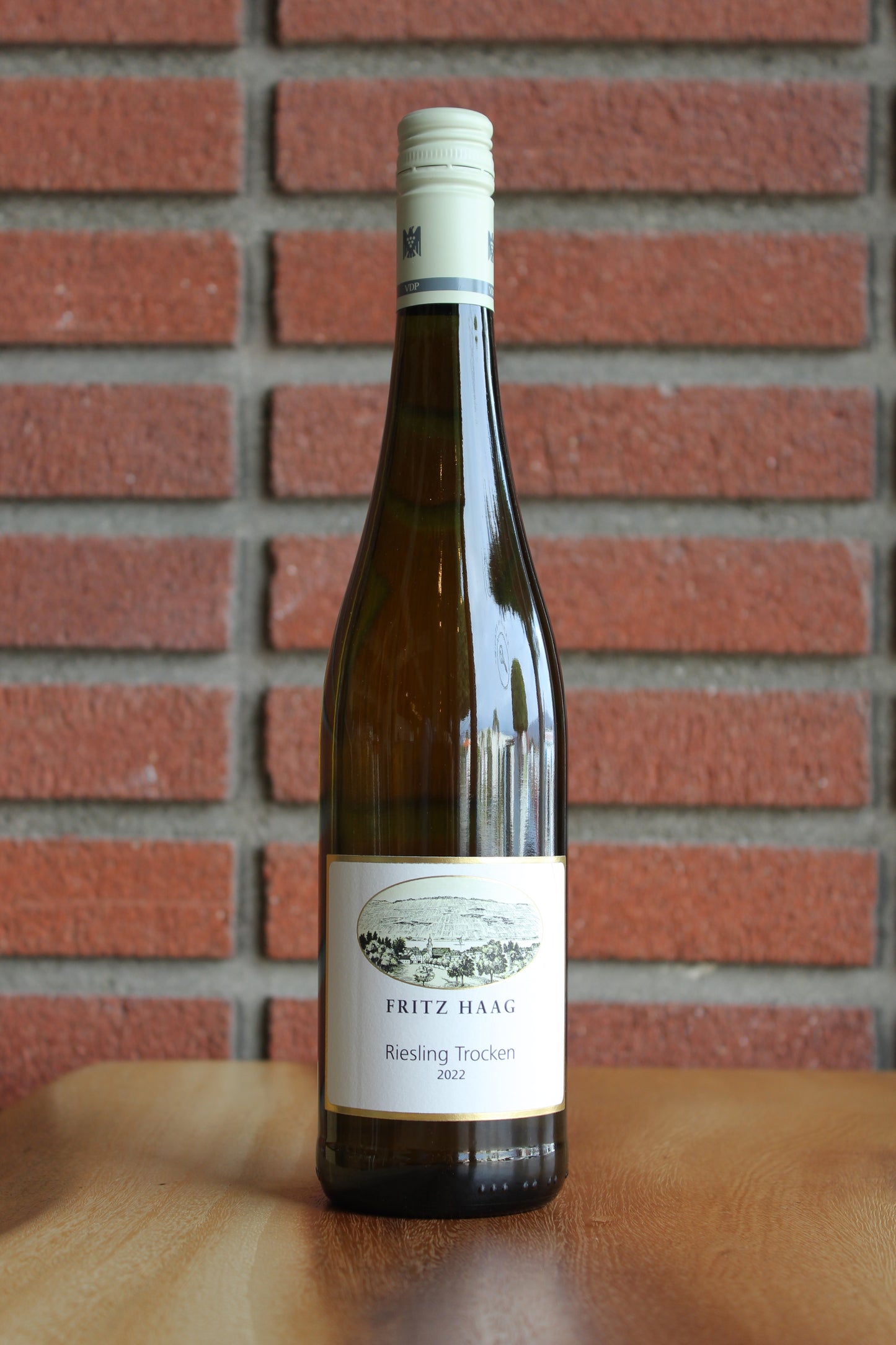Fritz Haag Estate Riesling Trocken 2022
Fritz Haag Estate Riesling Trocken 2022
Bernkastel, Mosel, Germany
Couldn't load pickup availability
Share

-
Tasting Notes
The 2022 Fritz Haag Estate Riesling Trocken is a vibrant, bone-dry expression of Mosel Riesling, harvested from the steep, slate-rich vineyards of Brauneberg, Mühlheim, and Burgen. Despite a challenging vintage with extreme summer dryness and variable autumn weather, this Riesling showcases exceptional quality. Its deep-rooted, older vines thrived, producing a wine that balances brisk acidity with concentrated fruit flavors and a fine, delicate texture.
Enticing aromas of spring meadows, fresh apples, and pears greet the nose, while the palate is bright and refreshing with notes of lime, green apple, and a hint of slate-driven minerality. Its moderate acidity delivers a mouthwatering finish, making it an ideal pairing for briny oysters, fried fish, or sushi. Perfect as an aperitif, this wine demonstrates a refined elegance and promises further development with time, despite its already impressive concentration and balance.
This Riesling’s vibrant fruit, lightness, and precision make it a standout for those seeking a crisp, versatile dry white -
Story
The Fritz Haag Estate is a historic family winery located in the heart of the Mosel Valley, with roots dating back to 1605. Situated in the renowned village of Brauneberg, once known as “Dusemond,” the estate is synonymous with some of the finest Riesling wines in the region. The village’s name was changed in 1925 to reflect the area's famous slate soils, which play a critical role in shaping the estate's distinctive wines. The family-owned vineyard covers 29 hectares (72.5 acres) of steep, slate-rich slopes, producing Rieslings that span the full spectrum—from dry to lusciously sweet. The unique combination of mineral-driven slate soils and the area’s mild climate gives Fritz Haag Rieslings their signature elegance, pronounced acidity, and long aging potential.
Under the leadership of Wilhelm Haag, who was recognized as Gault Millau’s first "Winemaker of the Year," the estate gained international acclaim. Since 2005, his son Oliver Haag has taken over, continuing to elevate the estate’s reputation. The estate’s prized vineyards, "Brauneberger Juffer" and "Brauneberger Juffer Sonnenuhr," date back centuries and were even revered by Napoleon. The name "Juffer," meaning "virgin" or "old maid," honors the three daughters of an aristocratic family who inherited and managed these renowned vineyards. Today, Fritz Haag's Rieslings, known for their refined palate with notes of honeysuckle, pears, apples, citrus, and mineral undertones, are celebrated as some of the most elegantly structured wines in the Mosel region.
-
Somm Notes
In German Riesling, the term "Trocken" refers to a dry style of wine. It indicates that the wine contains very little residual sugar, typically less than 9 grams per liter, balanced by the wine's acidity. Trocken wines are crisp and refreshing, offering flavors of citrus, green apple, and minerals, with a clean, dry finish.
The Fritz Haag Wine Estate practices sustainable winegrowing with a focus on environmental, winery, and social responsibility. In the vineyards, they manage erosion, promote biodiversity, use natural fertilization, and avoid pesticides, ensuring a balanced ecosystem. The winery adopts smart water and energy management, reduces waste, and minimizes contamination, while its close proximity to vineyards further enhances efficiency. Socially, the estate maintains high ethical standards, provides a quality work environment, and fosters a deep connection to the vineyard. These principles ensure long-term sustainability across all operations
Some Classic Pairings include:
- Seafood: Shellfish, especially oysters or shrimp, as Riesling’s acidity cuts through the briny flavors.
- Spicy Asian cuisine: The wine's freshness balances the heat in dishes like Thai or Szechuan.
- Pork: Riesling’s acidity complements the richness of pork dishes.
Pairings Perfect for Fall include:
- Roasted Root Vegetables: The tart lime and green apple flavors of the Riesling complement the natural sweetness of roasted carrots, parsnips, and beets.
- Butternut Squash Soup: The wine's acidity cuts through the creamy texture of fall soups, like butternut squash or pumpkin, balancing out their richness.
- Pork Dishes: Pork roast with apples or a glazed ham pairs well with the Riesling's fruit-forward notes, particularly green apple and citrus.
- Turkey with Herb Stuffing: The wine's minerality and acidity work well with herb-infused turkey and stuffing, making it a good choice for a fall meal or even Thanksgiving.
- Mushroom Risotto: The earthy flavors of mushrooms are elevated by the bright, zesty qualities of the wine, making this an elegant pairing.
Reviews:
90 points - James Suckling
Enticing aromas of spring meadows, crisp apples and pears. Refreshing to the point of being mouthwatering, although the acidity is moderate in the Mosel context.
90 points - Mosel Fine Wines
“It proves beautifully subtle and balanced on the palate and leaves a great elegant feel in the finish. A subtle dash of zest adds precision to the finish.
-
Region
Vineyard Sources: Brauneberg, Burgen, Mühlheimion
Soil Composition -
Brauneberg, Burgen, and Mühlheim are marked by distinctive soils, primarily weathered slate with higher concentrations of iron oxide in Brauneberg. This gives the wines from Brauneberg a certain richness and structure, contributing to their bolder character. The iron-rich soils are known to add a layer of complexity, similar to other wine regions with such soil types, like Pommard in Burgundy. In contrast, Rieslings from the Mosel, particularly from its cooler subregions, tend to exhibit more refined minerality and elegance due to the blue-gray Devonian slate that dominates the region

